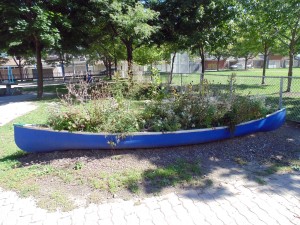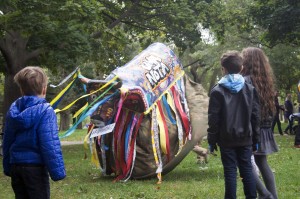
This canoe at Christie Pits Park serves as a planter for milkweed, essential for the survival of monarch butterflies. It is also a source of nectar for bees and other pollinators. COURTESY JODE ROBERTS, DAVID SUZUKI FOUNDATION
COURTESY JODE ROBERTS, DAVID SUZUKI FOUNDATION
Tired canoes re-purposed as pollinator point
By Samina Esha
On July 18, Homegrown National Park, a David Suzuki Foundation project, hosted their second successful year of a community Canoe Garden after last year’s effort to enhance Toronto’s green space.
The goal of the project is to fill canoe planters with native plants that are friendly for bees, insects, and birds to help with the pollinating process.
“My son helped plant one of the first canoes. So he has this deep connection to this canoe and the plants at Christie Pits. Every time we are down there he has to go and check it,” said Jode Roberts of the David Suzuki Foundation.
In 2014 the project was expanded into neighbourhoods throughout the Garrison Creek corridor, and it has recruited about two dozen trainees called Homegrown park rangers, who live, work, and play in their prospective areas.
“We connect them with different groups and encourage them to focus on the issues they are interested in. Then we let them loose while supporting them with their projects,” said Roberts.
Spearheaded by Parkdale resident and Homegrown ranger Aidan Dahlin Nolan, along with the David Suzuki Foundation, the project aims to see canoe planters installed in a number of city parks, including Christie Pits, Trinity Bellwoods, Little Norway, Bickford Park, and Stanley Park. Inspired by authors Richard Louv and Douglas Tallamy, the team embarked on a mission to establish the world’s first Homegrown National Park.
Dahlin Nolan got the idea about canoes and green space while he was camping with friends at the Algonquin Park.
“I started pitching different ideas to Ph.D. programs until I joined the David Suzuki Foundation,” said Dahlin Nolan, who is project lead for Community Canoe and a Ph.D. student at York University. “The community really came forward for the Stanley Park Canoe. The plants we planted are suitable for bees and butterflies and other pollinating insects, and each canoe has a canoe captain who is a member of the community and is responsible for watering and weeding. So, there is someone always looking after them.”
Last summer the group fundraised 5,000 dollars over 20 days to buy used canoes and plants for the garden. And this summer they are continuing this process with schools and parks. The crowd-funded project to turn Toronto into Canada’s first Homegrown National Park was the first step to changing our ever-busy everyday grey life in this urban city.
All of the canoes so far have been through the old route of Garrison Creek and next year the group aims to remind Torontonians about the routes of other old river paths. However, finding these canoes can be hard.
“When canoes are busted people usually just send them out to landfills so there is a scarcity of retired canoes. We usually get most of them from donation or buy fixer uppers from Kijiji so the money raised is mostly used for planting. I currently have three canoes sitting in my back yard,” said Roberts.
Roberts also mentioned that the David Suzuki Foundation is constantly coming up with different projects. “We encourage and welcome people to go to the davidsuzuki.org/homegrown website where all of our different activities are listed. Some of these projects include planting pollinator gardens at school yards and parks hosting educational events regarding the environment, and generally encouraging people to get connected with nature,” said Roberts.
Teamed with neighbourhoods, volunteers, and experienced park rangers with diverse backgrounds, the project aims to bring residents, businesses, and institutions together to plant native trees and grow gardens. It challenges people to connect to nature.
“In the long term a canoe is just an element we can add to the parks or different green spaces including front yards, back yards, streets, rooftops, alleyways, and all the bits between them. It is the first step towards a more pollinator friendly green space,” said Roberts.

